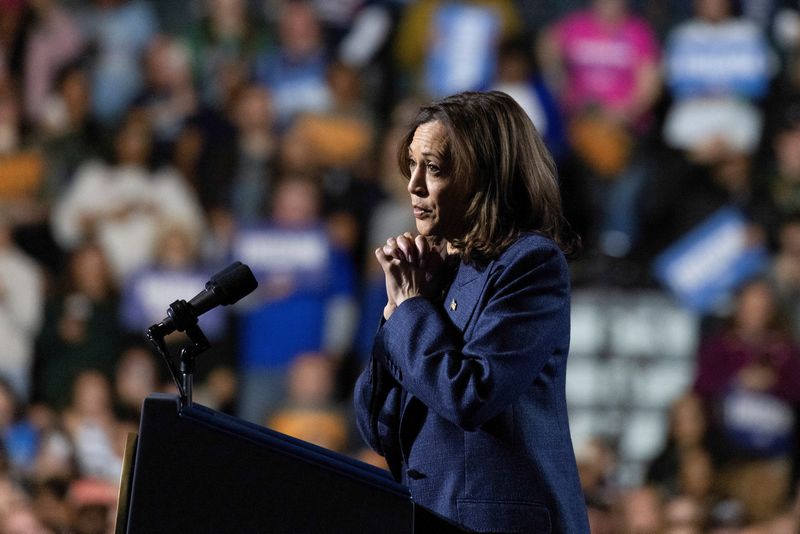By Howard Schneider
WASHINGTON (Reuters) – For six months or so in 2021, as vaccines paved an economic reopening from the COVID-19 pandemic and fresh waves of federal benefits flowed to household bank accounts, President Joe Biden’s administration reaped the benefit with an approval rating pinned above 50%.
It has been mired around 40% ever since, with the scarring impact of subsequently high inflation still cited by voters as a major issue even though the pace of price increases has declined, wages and the economy continue to grow, and the jobless rate remains low.
As good as the economy might seem across most major indicators, inflation that peaked at 9% more than two years ago has been hard for Vice President and Democratic nominee Kamala Harris to outrun, and given former President and Republican candidate Donald Trump a cudgel that remains effective on the eve of the election even as inflation has dwindled to 2.4%.
“Inflation has not faded as an issue,” said Justin McCarthy, a spokesperson for Gallup, the polling giant that fields monthly surveys that include an open-ended question, without lists or prompts, of what respondents feel is the “most important” issue facing them. Those citing inflation as the most serious issue has fallen from highs of around 20% during the peak inflation surge in 2022 to around 15% in recent polls, but that remains double the historic norm and is part of broader concern about the economy cited by more than 40% of respondents.
It’s an area where Trump continues to hold a polling edge despite Harris’ pledges to address issues like high housing costs or the “price gouging” she cites as a cause of high prices in the grocery aisle.
In a recent Reuters/Ipsos poll, 68% of respondents in seven swing states said the cost of living was “on the wrong track,” and 61% said the same about the economy. Half said Trump had “a better plan, policy or approach” to managing the economy compared with 37% for Harris, while on inflation Trump was favored 47% to 34%. In-person voting concludes on Tuesday, with polls showing an overall tight race between Harris and Trump nationally and in the battleground states seen as determining the outcome.
The Biden administration and later the Harris campaign recognized early on the problem inflation posed.
Biden named one of his signature pieces of legislation the “Inflation Reduction Act,” though much of it focused on subsidies for electric vehicles and clean energy. As rising rent and housing prices emerged as a particularly acute issue, they launched proposals that included capping rent increases, tax incentives for affordable housing construction, and downpayment help for first-time home buyers.
What they didn’t publicize so much is how sticky a problem it would be for the households living through it.
Attitudes improved somewhat as inflation began to ease last year, but the change only went so far.
‘UNAMBIGUOUSLY NEGATIVE’
Solutions have been offered by both campaigns, but inflation, the responsibility first and foremost of the Federal Reserve through its management of interest rates and credit conditions, is difficult for elected officials to address.
Republican President Richard Nixon tried the direct route by freezing wage and price increases for 90 days in 1971 and establishing a government panel to approve them after that. Inflation was 4.3% at the time and did fall below 4% in the summer of 1972 as Nixon campaigned for reelection.
But it soared that fall as the controls were eased, and following an embargo by Arab oil exporters in 1973 exceeded 12% by the end of 1974.
When inflation started rising during his term in office, Democratic President Jimmy Carter used a major address in 1978 to announce plans to limit government spending and call for voluntary wage and price limits from business. By the middle of his losing reelection bid against Republican Ronald Reagan prices were rising more than 14% annually.
After two recessions, a period of punishing interest rates imposed by the Fed and its firmer commitment to inflation control, price increases gradually settled close to the 2% level the central bank eventually adopted as its official target – and stayed there until the COVID-19 pandemic.
Economists have sparred over the exact reasons inflation took off beginning in 2021, and if that could have been prevented. But they generally agree on the broad mix. As the pandemic limited spending on in-person services, it also created deep backlogs in the manufacture and delivery of the goods, from bikes to appliances to automobiles, that were suddenly in high demand as a result of roughly $5 trillion in stimulus from the federal government.
The pandemic support began under Trump; Biden added more in a move some economists feel may have supercharged demand beyond what was needed.
It is a debate being litigated in hindsight and in the shadow of a health crisis that lingered long enough – new COVID variants were still suppressing in-person gatherings through 2021 – to even implicate the Fed. Inflation took off in 2021; the central bank did not raise rates until March 2022.
What doesn’t seem in doubt is the impact on the public mood, something that shouldn’t be a surprise.
Surveys about inflation have been consistent in finding that price shocks register deeply and are not quickly forgotten.
“Inflation significantly complicates household decision-making, which is seen as its most critical consequence,” researchers Alberto Binetti of Bocconi University and Francesco Nuzzi and Stefanie Stantcheva of Harvard University concluded from the results of an online survey of 2,264 people conducted between March and May. “This complexity affects daily economic choices” and adds to economic uncertainty.
Nor do people seem to care much if, as has happened recently and Democrats have tried to emphasize, wages rise faster than prices.
“Inflation is perceived as an unambiguously negative phenomenon without any potential positive economic correlates,” they found, with people expecting it to be fixed “without significant trade-offs.”

